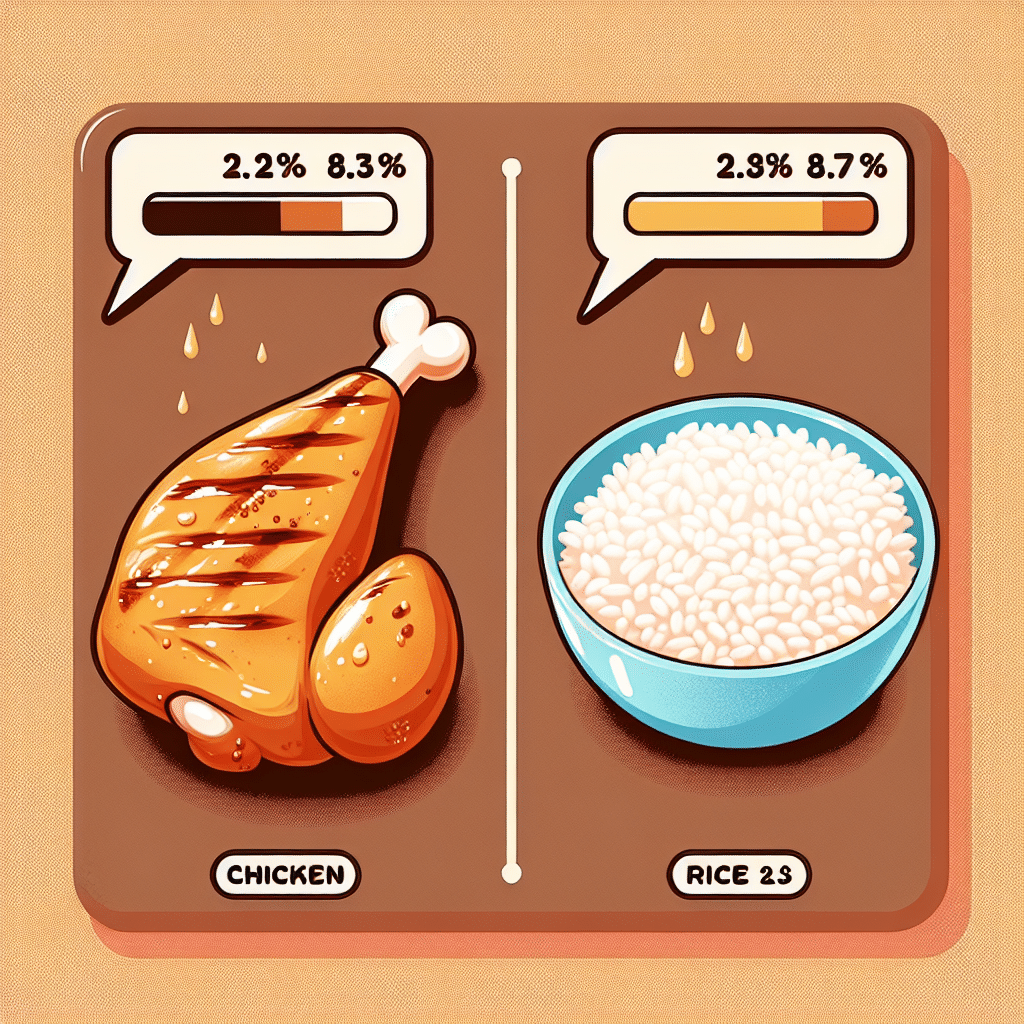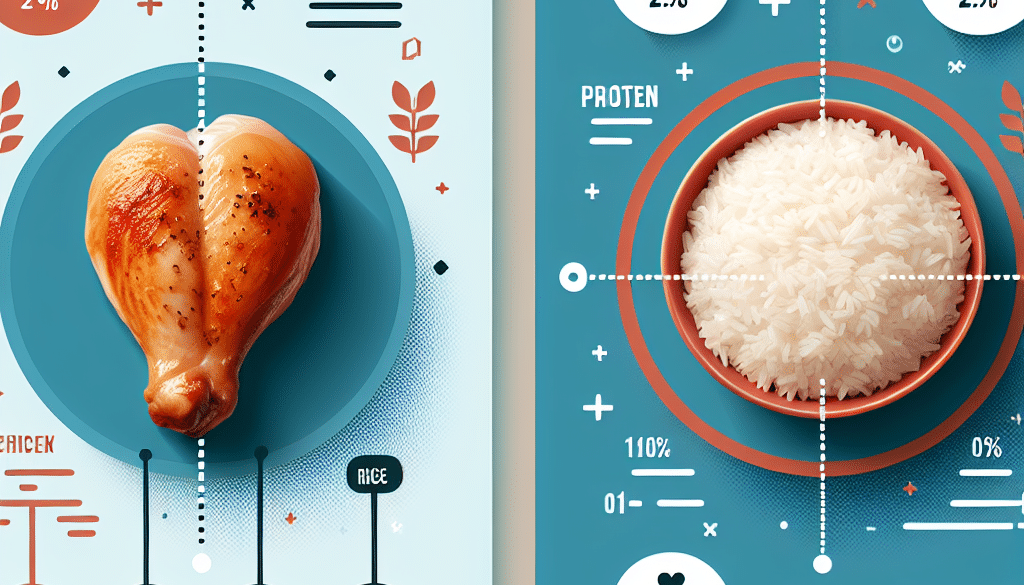Which Has More Protein Chicken Or Rice?
-
Table of Contents
- Protein Showdown: Chicken vs. Rice – A Comprehensive Analysis
- Understanding Protein and Its Importance
- Protein Content in Chicken
- Protein Content in Rice
- Comparing Chicken and Rice
- Protein Quality and Digestibility
- Protein Needs and Dietary Considerations
- Conclusion: The Protein Verdict
- Explore ETprotein’s High-Quality Protein Products
Protein Showdown: Chicken vs. Rice – A Comprehensive Analysis

When it comes to dietary protein, there’s often a debate about the best sources. Two common staples in many diets are chicken and rice. While one is a meat product and the other a grain, both are integral to various cuisines worldwide. But which one packs more protein? This article delves into the protein content of chicken and rice, comparing their nutritional profiles and discussing the role of protein in our diets.
Understanding Protein and Its Importance
Protein is a macronutrient essential for building and repairing tissues, making enzymes and hormones, and supporting immune function. It’s made up of amino acids, the building blocks that are vital for health. There are 20 different amino acids, and while the body can produce some, nine are considered essential, meaning they must be obtained through diet.
Protein Content in Chicken
Chicken is a high-quality protein source, meaning it contains all nine essential amino acids. It’s a staple in many diets due to its versatility and relatively low cost. The protein content in chicken can vary depending on the cut. Here’s a breakdown:
- Chicken breast: Approximately 31 grams of protein per 100 grams (3.5 ounces)
- Chicken thigh: About 26 grams of protein per 100 grams
- Chicken drumstick: Roughly 28 grams of protein per 100 grams
- Chicken wing: Around 30 grams of protein per 100 grams
Chicken breast is often the preferred choice for those looking to maximize their protein intake due to its high protein-to-fat ratio.
Protein Content in Rice
Rice, particularly white rice, is a staple grain consumed by billions of people worldwide. It’s a source of carbohydrates but also contains protein. However, rice protein is not complete, as it lacks adequate amounts of some essential amino acids, particularly lysine. Here’s the protein content for rice:
- White rice: About 2.7 grams of protein per 100 grams (cooked)
- Brown rice: Approximately 2.6 grams of protein per 100 grams (cooked)
While brown rice has a similar protein content to white rice, it’s often considered a healthier option due to its higher fiber content and nutritional profile.
Comparing Chicken and Rice
When directly comparing the two, chicken is the clear winner in terms of protein content. With over ten times the amount of protein per 100 grams, chicken provides a much more concentrated source of this macronutrient. However, it’s important to consider the role of each food in a balanced diet. Rice serves as an energy source due to its carbohydrate content, while chicken is a primary protein source.
Protein Quality and Digestibility
Not all protein is created equal. The quality of protein is determined by its amino acid composition and digestibility. Animal proteins like chicken are considered high-quality proteins because they contain all essential amino acids in proportions similar to those required by the body. Plant proteins, like those found in rice, are typically lower in one or more essential amino acids.
However, combining different plant proteins can provide a complete amino acid profile. For example, rice and beans together form a complete protein, as beans are high in lysine, which rice lacks.
Protein Needs and Dietary Considerations
The amount of protein an individual needs can vary based on factors such as age, sex, weight, and activity level. The Recommended Dietary Allowance (RDA) for protein is 0.8 grams per kilogram of body weight per day for adults. Athletes or those looking to build muscle may require more.
It’s also important to consider dietary preferences and restrictions. For vegetarians or those with certain health conditions, plant-based proteins are essential. In these cases, understanding how to combine plant proteins to meet amino acid needs is crucial.
Conclusion: The Protein Verdict
In the protein showdown between chicken and rice, chicken emerges as the superior source of protein. With its high-quality, complete protein profile, chicken is an excellent choice for those looking to increase their protein intake. However, rice remains an important part of a balanced diet, providing essential carbohydrates and other nutrients, especially when combined with other plant proteins.
For those seeking alternative protein sources, ETprotein offers a range of organic and vegan protein options, including rice protein, that can complement any diet.
Explore ETprotein’s High-Quality Protein Products
If you’re looking for diverse protein options, ETprotein’s product line is worth exploring. They offer organic rice protein and other plant-based proteins that cater to various dietary needs and preferences. Their products are characterized by a neutral taste, non-GMO, and allergen-free attributes, with high purity levels, making them suitable for a wide range of applications.
Whether you’re a manufacturer, distributor, or consumer, ETprotein provides tailored solutions to meet your protein requirements. Their commitment to quality and customer service makes them a reliable partner in the nutrition industry.
About ETprotein:
ETprotein, a reputable protein and L-(+)-Ergothioneine (EGT) Chinese factory manufacturer and supplier, is renowned for producing, stocking, exporting, and delivering the highest quality organic bulk vegan proteins and L-(+)-Ergothioneine. They include Organic rice protein, clear rice protein, pea protein, clear pea protein, watermelon seed protein, pumpkin seed protein, sunflower seed protein, mung bean protein, peanut protein, and L-(+)-Ergothioneine EGT Pharmaceutical grade, L-(+)-Ergothioneine EGT food grade, L-(+)-Ergothioneine EGT cosmetic grade, L-(+)-Ergothioneine EGT reference grade and L-(+)-Ergothioneine EGT standard. Their offerings, characterized by a neutral taste, non-GMO, allergen-free attributes, with L-(+)-Ergothioneine purity over 98%, 99%, cater to a diverse range of industries. They serve nutraceutical, pharmaceutical, cosmeceutical, veterinary, as well as food and beverage finished product distributors, traders, and manufacturers across Europe, USA, Canada, Australia, Thailand, Japan, Korea, Brazil, and Chile, among others.
ETprotein specialization includes exporting and delivering tailor-made protein powder and finished nutritional supplements. Their extensive product range covers sectors like Food and Beverage, Sports Nutrition, Weight Management, Dietary Supplements, Health and Wellness Products, and Infant Formula, ensuring comprehensive solutions to meet all your protein needs.
As a trusted company by leading global food and beverage brands and Fortune 500 companies, ETprotein reinforces China’s reputation in the global arena. For more information or to sample their products, please contact them and email sales(at)ETprotein.com today.












